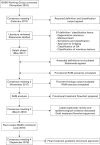Arthroscopic meniscal surgery: a national society treatment guideline and consensus statement
- PMID: 31154847
- PMCID: PMC6568024
- DOI: 10.1302/0301-620X.101B6.BJJ-2019-0126.R1
Arthroscopic meniscal surgery: a national society treatment guideline and consensus statement
Abstract
Aims: The aim of the British Association for Surgery of the Knee (BASK) Meniscal Consensus Project was to develop an evidence-based treatment guideline for patients with meniscal lesions of the knee.
Materials and methods: A formal consensus process was undertaken applying nominal group, Delphi, and appropriateness methods. Consensus was first reached on the terminology relating to the definition, investigation, and classification of meniscal lesions. A series of simulated clinical scenarios was then created and the appropriateness of arthroscopic meniscal surgery or nonoperative treatment in each scenario was rated by the group. The process was informed throughout by the latest published, and previously unpublished, clinical and epidemiological evidence. Scenarios were then grouped together based upon the similarity of clinical features and ratings to form the guideline for treatment. Feedback on the draft guideline was sought from the entire membership of BASK before final revisions and approval by the consensus group.
Results: A total of 45 simulated clinical scenarios were refined to five common clinical presentations and six corresponding treatment recommendations. The final guideline stratifies patients based upon a new, standardized classification of symptoms, signs, radiological findings, duration of symptoms, and previous treatment.
Conclusion: The 2018 BASK Arthroscopic Meniscal Surgery Treatment Guidance will facilitate the consistent identification and treatment of patients with meniscal lesions. It is hoped that this guidance will be adopted nationally by surgeons and help inform healthcare commissioning guidance. Validation in clinical practice is now required and several areas of uncertainty in relation to treatment should be a priority for future high-quality prospective studies. Cite this article: Bone Joint J 2019;101-B:652-659.
Keywords: Arthroscopy; Consensus; Guidance; Guidelines; Knee; Meniscal tear; Meniscectomy.
Figures
References
-
- Tornbjerg SM, Nissen N, Englund M, et al. Structural pathology is not related to patient-reported pain and function in patients undergoing meniscal surgery. Br J Sports Med 2017;51:525–530. - PubMed
-
- Herrlin S, Hållander M, Wange P, Weidenhielm L, Werner S. Arthroscopic or conservative treatment of degenerative medial meniscal tears: a prospective randomised trial. Knee Surg Sports Traumatol Arthrosc 2007;15:393–401. - PubMed



